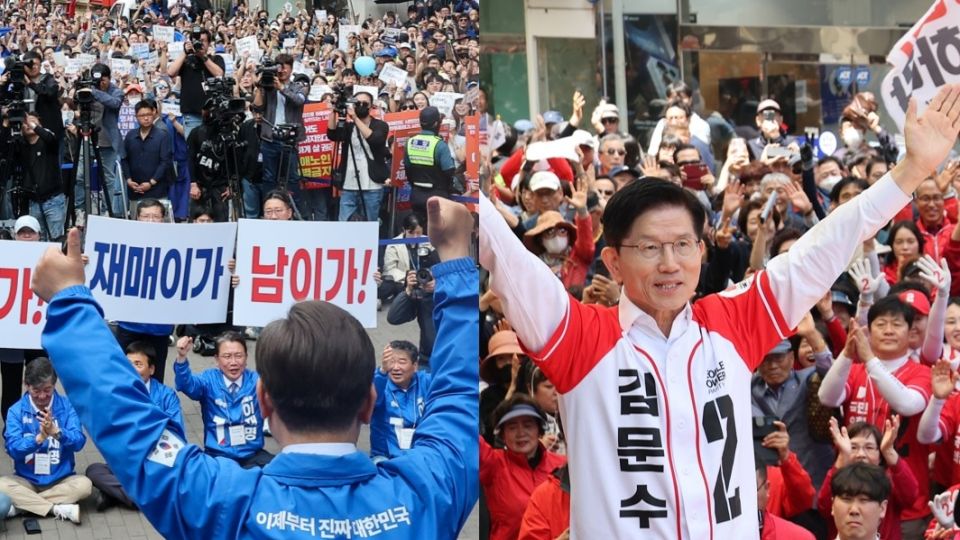May 14, 2025
DAEGU – The Democratic Party of Korea’s presidential candidate Rep. Lee Jae-myung, the People Power Party’s Kim Moon-soo and Lee Jun-seok of the New Reform Party rallied in South Korea’s conservative southeastern region on the second day of official campaigning.
Lee, the liberal front-runner, sought to win over undecided voters, while conservative candidate Kim aimed to consolidate his base in the region. Meanwhile, Lee Jun-seok of the minor New Reform Party focused his efforts on connecting with younger voters.
Lee Jae-myung’s visit appeared to be a strategic attempt to court conservative voters who may have been left disillusioned by the recent political turmoil sparked by former President Yoon Suk Yeol’s brief imposition of martial law.
During the 60-year-old’s visit to Daegu, he said it was time for voters to ditch thinking based in regionalism and to let pragmatism set in.
“We don’t have to distinguish between left and right, red and blue, … Do we have the luxury of being so biased?” Lee said. Red is the color of the People Power Party and blue symbolizes the Democratic Party.
Lee also blasted the lawmakers of the main conservative party for failing to cope with Daegu’s economic downturn and the outflow of young adults.
“If you blindly vote for the red, (the elected) will regard voters as a means (to winning a parliamentary seat) instead of serving them,” Lee said.
This followed an announcement by former Daegu Mayor Hong Joon-pyo’s aides that they would endorse Lee, saying their decision is meant to safeguard the value of the conservatives. Hong quit the People Power Party after he failed to make a cut at the presidential primary.
Earlier in Gumi, North Gyeongsang Province, Lee also suggested that the region could transform itself into a renewable energy hub, saying its rural area could find an economic breakthrough by incentivizing residents to install solar panels in empty farmland.
Polls show that Lee’s popularity has continued to lag in the region, although he remains the front-runner nationwide by a wide margin in polling for the June 3 election.
Among those identified as originating from Daegu or neighboring North Gyeongsang Province, 19 percent chose Lee as the most favored among all presidential hopefuls in the weekly poll for the fourth week of April, according to Gallup. His popularity nationwide stood at 38 percent in the same poll.
Regionalism in the modern-day politics of South Korea has deep roots. The country experienced rapid economic growth and industrialization especially during the authoritarian rule of Park Chung-hee, which largely fostered development in the southeast by nurturing manufacturing bases for textiles and electronics goods in the 1970s, while leaving the southwest behind.
The history of regional divide has since run through the democratic history of South Korea and continues to this day.
In Gumi, the birthplace of former President Park, Lee addressed the crowd: “Does it matter whether it’s Park Chung-hee’s policy or Kim Dae-jung’s policy? If it’s necessary, use it, and if it’s unnecessary or inefficient, throw it away. Does ideology really matter?”
The People Power Party’s presidential candidate Kim remained in the southeastern region for a second day in a row, after his first day of campaigning ended in Daegu.
Kicking off the second day at Sinam National Cemetery in Daegu, where over 50 bodies of people of distinguished service to independence are buried, Kim moved on to visit Ulsan and Busan to solidify his base.
Kim, 73, who was born in Yeongcheon, North Gyeongsang Province, said Tuesday that Park Chung-hee was a “great leader … who eradicated poverty in South Korea and accomplished the industrial revolution” that turned South Korea into a manufacturing powerhouse.
Meanwhile, Rep. Lee Jun-seok of the New Reform Party, who formerly chaired the People Power Party when Yoon Suk Yeol won the presidential election, focused on young people in the region. He had lunch with students at a cafeteria of Kyungpook National University in Daegu.
The minor candidate pointed out that the People Power Party’s Kim had already proved unpopular in the conservative stronghold, as he lost to his liberal rival Kim Boo-kyum, who later became a prime minister, at a Daegu constituency in a 2016 general election.


